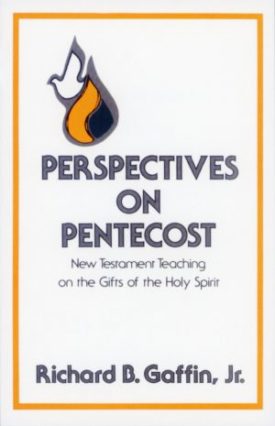A Brief Book Summary from Books At a Glance
By Steve West
About the Author
Richard B. Gaffin, Jr. is a leading Reformed scholar who is Professor Emeritus in biblical and theological studies at Westminster Theological Seminary. He is the author of a variety of distinguished books and articles.
Introduction
This book is an exegetical and theological examination of the Bible’s teaching on Pentecost, the Spirit, and spiritual gifts. Gaffin presents the uniqueness of the Day of Pentecost in its relationship to the finished work of Christ and in its redemptive-historical context. His exegetical work and theological analysis of the cessationist vs. continuationst positions leads him to conclude that the gifts of prophecy and tongues were withdrawn from the church at the end of the apostolic age.
Table of Contents
Chapter 1 A Promise and a Plea
Chapter 2 The Gift of the Spirit
Chapter 3 Some Basic Perspectives on the Gifts of the Spirit
Chapter 4 Prophecy and Tongues
Chapter 5 The Question of Cessation
Chapter 6 Quenching the Spirit?
Summary
Chapters 1 & 2: A Promise and a Plea. The Gift of the Spirit.
Although controversy in the church can be distressing, when we humbly acknowledge the final authority of God’s Word, we can work together to try to come to unity in the truth. We should trust the promise of God that his Spirit will lead us in his Word so that we can understand what he desires for the church. Scripture must be the interpreter of our experience—experience is not our authority. The fact that Christians who are committed to the Word are divided in their interpretation of spiritual gifts shows how difficult working through the subject can be.
The vast majority of NT references to the Spirit are found after the Gospels. In the Gospels, the focus is on Jesus, and the Spirit is seen as a future gift. In Acts and the Epistles, the Spirit is a present reality. The Day of Pentecost when the Spirit was poured out marks this decisive historical shift. Jesus pours out the Spirit on Pentecost since Jesus’ ministry secured and communicated this gift to the church. Jesus’ ministry as a whole consists of baptizing with the Spirit. The death of Jesus was his baptism ordeal. He baptizes in fire and judgment. His earthly ministry looks forward to the baptism of the Spirit, and on Pentecost, this promise is fulfilled. The outpouring of the Spirit fulfills God’s covenantal promises in response to the finished work of Christ. At Pentecost, Christ comes to the church through the person of the Spirit. Christ is present and active by and in the Spirit. At Pentecost, the church is established as the new covenant people of God. Christology, pneumatology, and ecclesiology need to be considered together.
What happened at Pentecost is to be considered as a once-for-all special event in the history of redemption, rather than something that is to find ongoing application. It can no more be repeated than the death and resurrection of Christ can be. Acts 1:8 is programmatic for the book, and the Book of Acts shows how this promise addressed to the disciples was historically fulfilled. Acts is not first to be read as a collection of anecdotes of personal experience. As the gospel advances and the Spirit is given to new groups, we see the salvation-historical extension of Pentecost, as witnessed and confirmed by the apostles.
The reception of the Spirit and speaking in tongues is evidently salvation-historical and does not stand as a normative, post-conversion experience. The gift of the Spirit is the life-giving Christ himself, and this must not be confused with the phenomena of fire or speaking in tongues.
References to being baptized by the Spirit occur seven times in the NT, with six of them speaking of Pentecost. 1 Cor. 12:13 is the only other reference to Spirit baptism, and in that verse, Paul makes it clear that every believer in the church has been baptized in the Spirit. Spirit baptism takes place at conversion when the individual is incorporated into the church. Those who argue for second-blessing experiences of the Spirit end up violating one of Paul’s basic points, which is that every believer has the Spirit, and the church is not divided into the haves and have nots. Every believer has been baptized by the Spirit, but every believer can grow and experience more of his presence as they walk with him. Spirit baptism is once for all time, but we can experience fresh fillings of the Spirit. His presence is found in daily obedience.
Every believer is united with the risen Christ and with each other through the Spirit. This covenantal union was unprecedented before Pentecost. In the Old Covenant, there was the promise of the Spirit, but in the New Covenant, there is fulfillment. . . .
[To continue reading this summary, please see below....]The remainder of this article is premium content. Become a member to continue reading.
Already have an account? Sign In
Buy the books

PERSPECTIVES ON PENTECOST: NEW TESTAMENT TEACHING ON THE GIFTS OF THE HOLY SPIRIT, by Richard B. Gaffin, Jr.